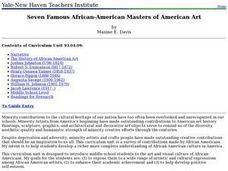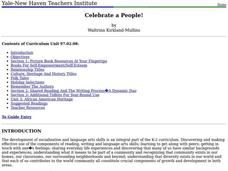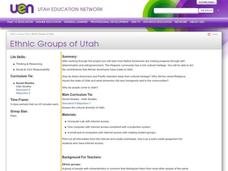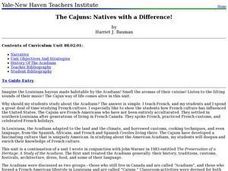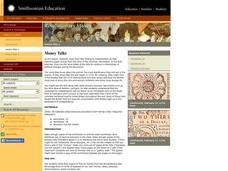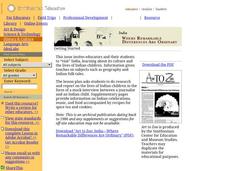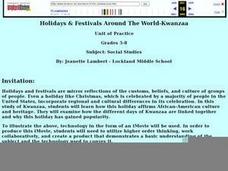Curated OER
Seven Famous African-American Masters of American Art
Learners examine seven different African-American artists. In groups, they use the internet to identify their contribution and techniques to the art world and examine the time period in which the artwork was produced. To end the...
Curated OER
Let Your Motto Be Resistance: African American Portraits: Grades 3-5
Students explore the contributions of African Americans of the 20th century. In this African American history lesson, students examine portraits of Muhammad Ali, Romare Bearden, Lorraine Hansberry, Judith Jamison, and Leontyne Price in...
Curated OER
Understanding and Appreciating Poetry: Afro-Americans and Their Poetry
Sixth graders are introduced to poems written by African-American authors. As a class, they read excerpts of poems from different time periods and discuss how and if anything has changed over time with discrimination and equal rights...
Curated OER
African American Heritage in Arkansas
Students research and write about three African American composers from Arkansas: Scott Joplin, Florence Price and William Grant Still.
Curated OER
Celebrate A People!
Young scholars explore African-American students literature as an integral building block in empowering all young scholars to a better awareness when reading and writing. They use as a productive Social Studies tool for overall...
Curated OER
The Finish Line
Students investigate the philanthropy of various cultural traditions. In this cultural education lesson, students read a handout about Native American, European American, and African American traditions and identify the philanthropic...
Curated OER
Art: Faith Ringgold Story Quilts
Twelfth graders examine the impact of African American culture on the United States by inspecting Faith Ringgold's story quilts. Working in groups, they create a collective story quilt about current cultural issues. They research their...
Curated OER
Mrs. Katz and Tush
Students read Patricia Polacco's Mrs. Katz and Tush before comparing Jewish heritage with Black history using a Venn Diagram. They complete the diagram either as a whole group or in a small group setting. Next, they sample the Jewish...
Curated OER
The Holy Land
Explore the culture, geography, and religion of Ethiopia. Learners complete a viewing guide while watching a film on Ethiopia as the first Christian country in Africa. Additionally, they create group presentations and write paragraphs...
Curated OER
Black Separatism or the Beloved Community? Malcolm X and Martin Luther King, Jr.
Students interpret historical evidence presented in primary and secondary resources. In this African American history lesson, students compare and contrast the tactics employed by Malcolm X and Martin Luther King,...
Curated OER
Ethnic Groups of Utah
Students investigate how ethnic minorities have impacted the State of Utah.
Curated OER
Letters from the Japanese American Internment
Students make deductions about life in an internment camp by reading and comparing letters written to Clara Breed. Along the way, they consider the advantages of looking at a historical event from the multiple points of view of...
Curated OER
Against the Odds: The Trials and Tribulations of the Harlem Renaissance
Students become familiar with the Harlem Renaissance movement. They present information gathered and discuss issues pertaining to African American art through a power point presentation as well as an oral presentation.
Curated OER
The Cajuns: Natives with a Difference!
Students examine the immigrant experiences of various culture groups. Using this information, they work together to compare and contrast these experiences with those of the Cajuns. As a class, they define ethnic group and research the...
Curated OER
North Carolina Place Names
Fourth graders examine a map of North Carolina to discover the heritage left behind in the names of various places. They compare/contrast those derived from Native American culture to those derived from European settlers.
Curated OER
Afro-Caribbean Americans and the Sugar Economy
Pupils read the narrative, Caribbean Immigration and examine how sugar production and migration of people of African origin have been intertwined for centuries. Working in three groups, they present oral reports on the three eras of the...
Curated OER
Exploring Cultural Rituals
Students analyze images and music of common rituals in America with those of other countries. They use worksheets to compare and contrast the events.
Curated OER
The Homestead Act
Eighth graders analyze the Native American's viewpoint of the Homestead Act. Using one Native American group who lived in Nebraska, they write a letter to the editor of a local newspaper discussing the Homestead Act and how it affected...
Curated OER
Money Talks
Learners move from fact finding to interpretation as they examine paper money from the time of the American Revolution. In the final exercise, they use the issue dates of the bills to construct a chronology of political changes during...
Curated OER
The Westward Movement
Students study the westward movement through examining stamps. In this westward movement lesson plan, students draw conclusions, determine cause and effect relationships and examine the westward movement of the United States by...
Curated OER
Family History
Students discover their family history. In this genealogy lesson, students participate in a discussion about family history and why it is important. Students create a family tree and present the family tree to the class. Students write a...
Curated OER
India: Where Remarkable Differences Are Ordinary
Students research India and Indian culture. In this Indian research lesson plan, students research and report on the lives of Indian children. The report will be in the form of a mock interview between a journalist and an Indian child....
Curated OER
The Witch of Goingsnake
Ninth graders explore legends and specifically the legend of Geronimo. In this legend lesson, 9th graders watch a movie 'Geronimo: An American Legend' and answer questions about the video.
Curated OER
Holidays & Festivals Around The World-Kwanzaa
Students use technology to conduct research. They use technology to convey principles and information. They demonstrate proficiency in the use of computer based technology.
